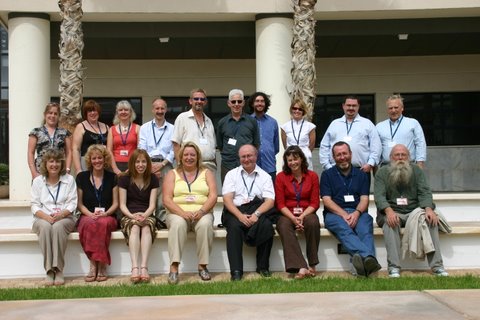Overview
Back to Top
Recent developments in web technology and ubiquitous access to the
internet have led to a position where eLearning is moving from being a
convenient paradigm for supporting distance learning to the position
where it is embedded as part of most students' educational experience.
Educational Institutions and their staff embrace such change at varying
speeds, and funding bodies, such as JISC in the UK, have funded
programmes to 'oil the wheels of change'. At the same time many
institutions have developed their own programmes for change.
The purpose of this workshop was to provide a forum for participants in
mature eLearning projects to exchange information about the lessons
learned from their projects in trying to bring about technological and
cultural change within their institutions.

The major outcomes of this workshop were a summary of the critical
success factors for embedding online and blended learning and a research agenda for future funded programmes to
address. These outputs will be realised in the publication of a JISC
report on the success factors and barriers to change.
All the papers presented and discussed at the workshop are available from this website. Selected papers from the workshop will be worked up for a special issue of the British Journal of Educational Technology (BJET) scheduled for publication in September 2007.
Papers
Back to Top
The papers accepted for the workshop are listed here in author order.
| Authors |
Title |
| Breslin, C., Nicol, D., Grierson, H.& Wodehouse , A. |
Embedding an Integrated Learning Environment and Digital Repository: Lessons Learned |
| Casey, J., Proven, J., & Dripps, D. |
Geronimo’s Cadillac: Lessons for Learning Object Repositories |
| Cook, J., Holley, D. & Andrew, D. |
Change in e-Learning in a UK university – London Met RLO-CETL |
| Davis, H. & Fill, K. |
Experiences and Reflections on trying to include E-Learning in a University’s Teaching Culture |
| Durham, H. & Arrell, K. |
Introducing new cultural and technological approaches into institutional practice: an experience from geography |
| Martin, D. & Treves , R. |
DialogPLUS: embedding eLearning in Geographical practice |
| McNicol, S. |
Embedding e-learning through teamwork: The role
of multi-disciplinary teams in the Digital Libraries in the Classroom
(DLiC) Programme |
| Stiles, M . |
Embedding eLearning – A Mixed Economy? |
| Wallace, I., West, J. & Donald, D. |
Putting the content into context: successful embedding of the Spoken Word project at Glasgow Caledonian University |
| White,S. |
Critical Success Factors for Institutional Change: Some Organisational Perspectives |
Presentations
Back to Top
The presentations are listed here in the order in which they were given at the workshop.
The presentations will be available online shortly.
Critical Success Factors
The workshop finished with a round table discussion and summing up facilitated by Susan Eales. The critical success factors identified are listed here: |
- A strategy needs to be for the right reason (you have to want to change)
- Agile learning technologist and technical support processes are needed (a ‘just-in time’ approach)
- Embedding needs to be at technological, pedagogical and cultural levels
- Active involvement and commitment of senior management
- Whole curriculum approach
- Put education before technology
- Funding, willingness to invest in buyouts for staff, keep it coming in for sustainability
- Project requirements set deadlines
- The more people who share in the design process the more likely the result will have common sharable outcomes.
- Share models so that people can recognise themselves within the models.
- Alignment with mission
- Dissemination to raise profile (inside and out)
- Faculty champions – communities of practice
- Collaboration with learner support services
- Understanding disciplinary differences
- Strategy for sustainability
- Open standards/ Open source
- Build for constant change (pedagogical pluralism)
- Employ students (bring a user and young person perspective)
- Need to work with the early majority
- Work with the real-politic of the institution
- Harness organisational objectives to make the change
- Use organisational structure to nurture change
- Make changes compatible with culture (work with the resistance)
- Share good (and bad) practice
- Learning technologists who have a basic understanding of the subject area (and of pedagogy); or a member of the team with both a technology and pedagogy background who can ‘interpret’ between academics and IT specialists
- Individuals who really want to know the answers to things and make change – enthusiasm
- Engagement of community in strategy
- Visibility of activity externally has helped enormously internally
- Rewards and accreditation of innovation/developers/early adopters.
|
The Workshop Chairs
Back to Top
Hugh Davis is the University Director of eLearning at the
University of Southampton, and also Head of the Learning Technology
Research Group within Electronics and Computer Science. He has been
involved as a change agent within university education for many years;
he is currently principal investigator on the DialogPLUS project, which
has been cooperatively designing learning activities for use in
undergraduate Geography teaching with partners in UCSB, Leeds and Penn
State universities
Susan Eales was a Programme Manager at JISC for
three years where her responsibilities included managing the Digital Libraries in
the Classroom and Exchange for Learning Programmes. She has
an extensive overview of the issues emanating from the projects in those and other programmes,
especially those to do with cultural change. Since June 2006, Susan has been Electronics Services Development Manager for the UK's Open University Library and Learning Resources Centre

